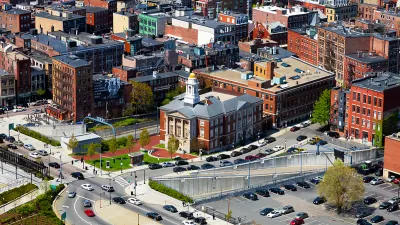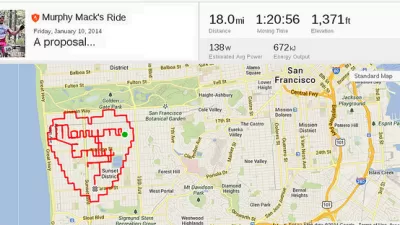Two planning researchers, one a professor at Tufts and another independent, make the case against apps as a panacea for urban problems.

Julian Agyeman and Duncan McLaren write a dissenting take on the trend of cities seeking the latest in "smart city" technology. According to their argument, "our current smart-city techno fetish rides roughshod across the public realm." Moreover, it "encourages the belief that there’s always 'an app for that' — that we can address deep-seated, structural urban problems through business-led technological innovation and somehow sidestep the messiness of inclusive politics."
As evidence to back up those claims, Agyeman and McLaren first cite the example of a partnership between the city of Boston and Waze, the Google-owned navigation app (not to be confused with the city of Boston's partnership with Uber, which has been the subject of recent criticisms). Despite seeming like a great idea, according to Agyre, and McLaren, the partnership with Waze "merely represents a Band Aid slapped over a problem that still requires brave new political thinking and much-needed infrastructure investment." Agyeman and McLaren's response to the problems of congestion would employ congestion pricing and transit investments, rather than relying on the effects of Waze's data-collection system.
FULL STORY: Apps don’t make a city smart

Trump Administration Could Effectively End Housing Voucher Program
Federal officials are eyeing major cuts to the Section 8 program that helps millions of low-income households pay rent.

Planetizen Federal Action Tracker
A weekly monitor of how Trump’s orders and actions are impacting planners and planning in America.

The 120 Year Old Tiny Home Villages That Sheltered San Francisco’s Earthquake Refugees
More than a century ago, San Francisco mobilized to house thousands of residents displaced by the 1906 earthquake. Could their strategy offer a model for the present?

HSR Reaches Key Settlement in Northern California City
The state’s high-speed rail authority reached an agreement with Millbrae, a key city on the train’s proposed route to San Francisco.

Washington State Legislature Passes Parking Reform Bill
A bill that would limit parking requirements for new developments is headed to the governor’s desk.

Missouri Law Would Ban Protections for Housing Voucher Users
A state law seeks to overturn source-of-income discrimination bans passed by several Missouri cities.
Urban Design for Planners 1: Software Tools
This six-course series explores essential urban design concepts using open source software and equips planners with the tools they need to participate fully in the urban design process.
Planning for Universal Design
Learn the tools for implementing Universal Design in planning regulations.
Ada County Highway District
Clanton & Associates, Inc.
Jessamine County Fiscal Court
Institute for Housing and Urban Development Studies (IHS)
City of Grandview
Harvard GSD Executive Education
Toledo-Lucas County Plan Commissions
Salt Lake City
NYU Wagner Graduate School of Public Service



























